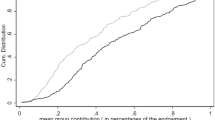Abstract
This paper compares different forms of leadership in their ability to improve cooperation in a public goods experiment. Leaders either contribute before the others (leading by example) or make a non-binding pledge before all players contribute simultaneously (leading by words). The exogenously imposed leadership is then compared to an endogenous setting where players can choose if and how they want to lead. The results show that in both settings leading by example has significant positive effects on cooperation while leading by words only has small effects as compared to situations without leadership. However, only few subjects choose to lead by example when they have the choice. The majority choose to lead by words or do not want to lead at all. The results also show that leading by example is associated with an institutional effect (players increase their contributions when they have to lead by example) and a selection effect (players who choose to lead by example are particularly cooperative).




Similar content being viewed by others
Notes
Table A1 in the Appendix gives an overview of experimental studies on unilateral leadership and communication.
The experimental instructions are provided in the Appendix.
Unless stated otherwise, all tests are two-sided.
Table A2 in the Appendix provides p-values for differences in payoffs between the treatments.
The subjects were not informed about the probability of the first-mover’s decision being overridden. This isn’t ideal but it was a compromise for the trade-off between asking first-movers hypothetically about their preferred form of leadership and collecting enough observations. The same approach was used in Dal Bó et al. (2010).
References
Arbak E, Villeval M-C (2013) Voluntary leadership: motivation and influence. Soc Choice Welf 40(3):635–662
Balliet D (2010) Communication and cooperation in social dilemmas: a meta-analytic review. J Confl Resolution 54(1):39–57
Bicchieri C (2002) Covenants without swords: group identity, norms, and communication in social dilemmas. Ration Soc 14(2):192–228
Bicchieri C, Lev-On A (2007) Computer-mediated communication and cooperation in social dilemmas: an experimental analysis. Polit Philos Econ 6(2):139–168
Bochet O, Page T, Putterman L (2006) Communication and punishment in voluntary contribution experiments. J Econ Behav Organ 60:11–26
Dal Bó P (2005) Cooperation under the shadow of the future: experimental evidence from infinitely repeated games. Am Econ Rev 95:1591–1604
Dal Bó P, Foster A, Putterman L (2010) Institutions and behavior: experimental evidence on the effects of democracy. Am Econ Rev 100:2205–2229
Fischbacher U (2007) Z-tree: zurich toolbox for ready-made economic experiments. Exp Econ 10:171–178
Frohlich N, Oppenheimer J (1998) Some consequences of email vs. face-to-face communication in experiment. J Econ Behav Organ 35:389–403
Greiner B (2004) An online recruitment system for economic experiments. In: Kremer K, Macho V (eds) Forschung und wissenschaftliches Rechnen 2003. Gesellschaft fur Wissenschaftliche Datenverarbeitung, Gottingen, pp 79–93
Güth W, Levati MV, Sutter M, van der Heijden E (2007) Leading by example with and without exclusion power in voluntary contribution experiments. J Public Econ 91:1023–1042
Haigner SD, Wakolbinger F (2010) To lead or not to lead—endogenous sequencing in public goods games. Econ Lett 108:93–95
Koukoumelis A, Levati MV, Weisser J (2012a) Leading by words: a voluntary contribution experiment with one-way communication. J Econ Behav Organ 81:379–390
Levati MV, Sutter M, van der Heijden E (2007) Leading by example in a public goods experiment with heterogeneity and incomplete information. J Conf Resolution 51:793–818
List JA, Lucking-Reiley D (2002) The effects of seed money and refunds on charitable giving: experimental evidence from a university capital campaign. J Polit Econ 110:215–233
Moxnes E, van der Heijden E (2003) The effect of leadership in a public bad experiment. J Conf Resolution 47:773–795
Pogrebna G, Krantz DH, Schade C, Keser C (2011) Words versus action as a means to influence cooperation in social dilemma situations. Theory Decision 71:473–502
Rivas MF, Sutter M (2011) The benefits of voluntary leadership in experimental public goods games. Econ Lett 112:176–178
Sally D (1995) Conversation and cooperation in social dilemmas: a meta-analysis of experiments from 1958 to 1992. Ration Soc 7:58–92
Skodvin T, Andresen S (2006) Leadership revisited. Global Environ Polit 6(3):13–27
Acknowledgments
I thank the MaXLab team at Magdeburg University for use of their laboratory. Financial support from Formas through the program Human Cooperation to Manage Natural Resources (COMMONS) is gratefully acknowledged. I’m also grateful to the SCW editors and three anonymous referees for their comments and suggestions.
Author information
Authors and Affiliations
Corresponding author
Electronic supplementary material
Below is the link to the electronic supplementary material.
Rights and permissions
About this article
Cite this article
Dannenberg, A. Leading by example versus leading by words in voluntary contribution experiments. Soc Choice Welf 44, 71–85 (2015). https://doi.org/10.1007/s00355-014-0817-8
Received:
Accepted:
Published:
Issue Date:
DOI: https://doi.org/10.1007/s00355-014-0817-8




